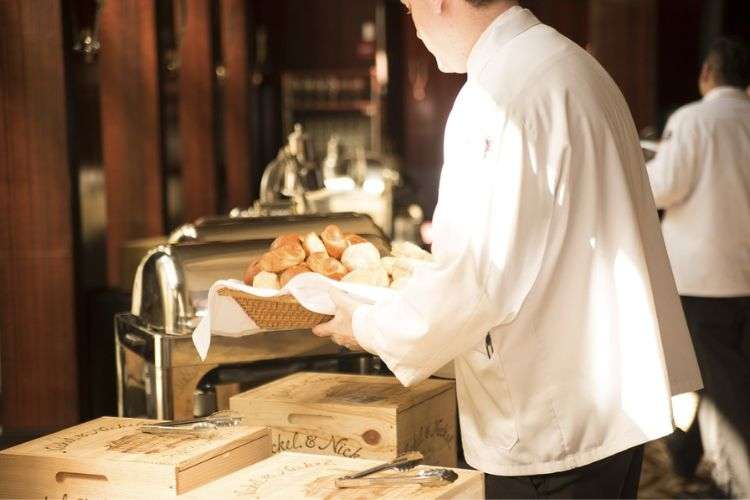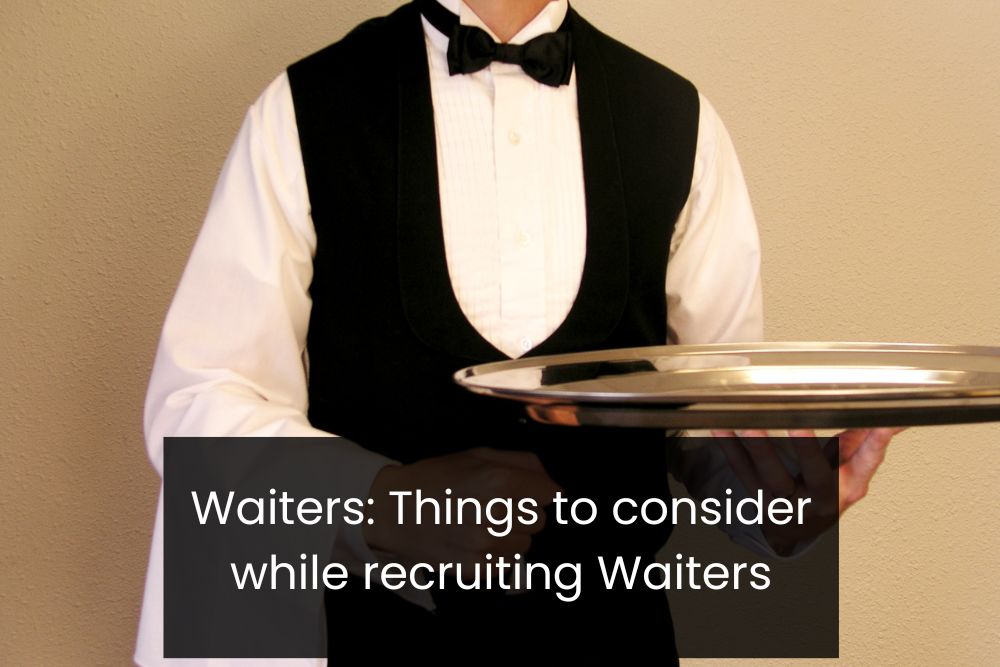In food service industry, hiring the right waiter staff is a critical factor in the success of any restaurant or eatery. The importance of selecting the perfect individuals to join your team cannot be overstated. The quality of service provided by your waitstaff can make or break the dining experience for your customers, and in turn, impact your establishment’s reputation and bottom line.
Key Takeaways:
| Takeaway | Description |
|---|---|
| 1. Quality Matters: | Select waitstaff based on qualities like customer service skills, attention to detail, and communication skills. |
| 2. Tailored Approach: | Adapt your recruitment and training strategies to suit the specific needs of your restaurant type. |
| 3. Comprehensive Training: | Thorough training, including menu knowledge, customer service, and technical skills, is essential for success. |
| 4. Competitive Compensation: | Offering competitive wages and benefits is a key factor in retaining talented waiter staff. |
| 5. Continuous Support and Development: | A supportive work environment and ongoing development opportunities contribute to staff satisfaction and retention. |
1 The Role of Waiters in the Food Service Industry
Waiters are the frontline ambassadors of your restaurant. They are the bridge between the kitchen and the diners, responsible for delivering not just food but an entire dining experience. Their role extends beyond simply taking orders and serving dishes. Waiters are the face of your establishment, interacting with customers, providing recommendations, and ensuring a smooth and enjoyable meal.
Looking for Waiters?
Call us at 087 738 8306 or Fill the form below and we will get back to you ASAP.
2 Qualities to Look for in Waiter Staff
When it comes to selecting the perfect waiter staff, it’s not just about finding individuals who can carry plates and take orders. The qualities they possess go far beyond the technical aspects of the job.
Here are the key qualities you should be on the lookout for:
A. Customer Service Skills
Outstanding customer service skills are the cornerstone of a great waiter. Waiters should be personable, attentive, and genuinely interested in providing a positive dining experience. They must be skilled in reading and understanding the needs and expectations of diverse customers. The ability to handle customer feedback, both positive and negative, with professionalism and grace is vital.
B. Communication Skills
Effective communication is at the heart of what waiters do. They need to listen to customer requests, communicate those orders accurately to the kitchen staff, and convey any special requests or dietary restrictions. Clear and courteous communication can enhance the dining experience and prevent misunderstandings or mistakes.
C. Attention to Detail
In the fast-paced environment of a restaurant, attention to detail is paramount. Waiters must ensure that orders are accurately taken and served, that the correct dishes are delivered to the right tables, and that customers’ special requests or dietary restrictions are accommodated. Even the smallest oversight can lead to customer dissatisfaction.
D. Physical Endurance
The role of a waiter is physically demanding. Waitstaff spend long hours on their feet, carrying trays of dishes, and moving swiftly between tables. Physical endurance and stamina are essential to keep up with the demands of the job, especially during busy shifts.
E. Relevant Experience
While experience isn’t always a deal-breaker, it can significantly impact a waiter’s ability to perform their duties effectively. Experienced waiters often come with a good understanding of restaurant operations, menu items, and customer service best practices. Hiring individuals with previous experience can lead to a shorter learning curve.
F. Team Player Attitude
A restaurant is a team effort, and waiters are a crucial part of that team. A team player attitude is essential for smooth cooperation with kitchen staff, bartenders, and fellow waitstaff. The ability to work cohesively with others can improve the overall efficiency and harmony in the restaurant.
3 Recruitment Process for Waiter Staff
A. Job Posting and Description
The recruitment process for waiter staff starts with crafting a compelling job posting and detailed job description. A well-crafted job posting is your first opportunity to attract potential candidates. It should include essential details such as job title, responsibilities, qualifications, and any specific requirements unique to your establishment.
To make your job posting more effective, consider the following tips:
- Use an engaging title: The job title should accurately represent the position but also be appealing to potential candidates. Instead of just “Waiter,” you might use “Customer Service Specialist” or “Dining Experience Ambassador.”
- Highlight the benefits: Mention any perks, benefits, or unique aspects of your restaurant that set it apart from others. This could include a friendly work environment, opportunities for career growth, or special training programs.
- Specify qualifications: Clearly outline the qualifications required, such as education, experience, or certifications. For example, if you’re hiring for a fine dining restaurant, a minimum level of formal training or experience may be necessary.
- Emphasize the role: Describe the waiter’s role in providing exceptional customer service, ensuring order accuracy, and promoting a positive dining experience. This gives candidates a clear understanding of what’s expected.
B. Screening Resumes
Once you’ve posted the job, you’ll start receiving resumes from potential candidates. The resume screening process is a crucial step in identifying individuals who meet your criteria.
When reviewing resumes, pay attention to the following:
- Relevant experience: Look for candidates with experience in similar roles or in the restaurant industry. Experience can be a strong indicator of a candidate’s ability to adapt quickly to your restaurant’s specific requirements.
- Education and certifications: Some candidates may have formal education in hospitality or relevant certifications, such as food safety or responsible alcohol service training. These qualifications can be valuable.
- Attention to detail: Assess the attention to detail by checking for typos or formatting errors on the resume. Attention to detail is a vital quality for waitstaff.
C. Conducting Interviews
Interviews are a critical part of the recruitment process. They provide an opportunity to gauge a candidate’s communication skills, demeanor, and fit within your team.
During the interview, consider asking questions like:
- How do you handle challenging or irate customers?
- Can you provide an example of a time when you went above and beyond to provide excellent service?
- How do you prioritize tasks in a busy restaurant environment?
Interviews also allow you to evaluate a candidate’s interpersonal skills, enthusiasm for the role, and overall professionalism.
D. Skills Assessment
To ensure that candidates possess the necessary skills to excel as waiters, consider conducting a skills assessment. This can involve practical tasks such as carrying a tray of dishes, taking a mock order, or explaining a menu item. A skills assessment helps determine if candidates can handle the physical demands and technical aspects of the job.
E. Checking References
Checking references is a crucial step to validate a candidate’s past work experience and performance. Contact previous employers or supervisors listed on the candidate’s resume and ask about their work ethic, punctuality, and ability to handle customer service challenges.
F. Background Checks
Background checks are essential to ensure the safety and security of your establishment and customers. This step is particularly important when hiring individuals who will handle financial transactions or alcohol service. Background checks can reveal any criminal history or past issues that might disqualify a candidate from the position.
Looking for Waiters?
Call us at 087 738 8306 or Fill the form below and we will get back to you ASAP.
4 Legal Considerations in Hiring Waiter Staff
A. Employment Laws and Regulations
Understanding and complying with employment laws and regulations is a fundamental aspect of the recruitment process. These laws govern various aspects of the employment relationship, including minimum wage, overtime, meal and rest breaks, and anti-discrimination laws.

To ensure compliance:
- Create and maintain a clear and fair compensation structure that adheres to minimum wage laws.
- Implement policies and procedures that prevent workplace discrimination and harassment.
- Familiarize yourself with relevant federal, state, and local employment laws that apply to your restaurant.
B. Work Permits and Visas for Non-Citizens
If your establishment hires non-citizens, it’s essential to navigate the legal requirements for work permits and visas. This can be a complex process, and it’s important to consult with immigration authorities or legal experts to ensure compliance.
C. Wage and Hour Laws
Wage and hour laws govern matters such as overtime pay, meal and rest breaks, and working hours. It’s crucial to establish clear policies and schedules that comply with these regulations. Failure to do so can lead to costly legal issues.
D. Health and Safety Requirements
Maintaining a safe working environment is not only a legal obligation but also a moral one. Health and safety requirements in the restaurant industry often pertain to issues like food handling, fire safety, and sanitation. Ensure that your restaurant follows all necessary guidelines to protect both employees and customers.
5 Training and Onboarding for Waiter Staff
A. Orientation and Introduction to Restaurant Policies
Once you’ve successfully recruited waiter staff, the next crucial step is their training and onboarding. This begins with a comprehensive orientation where new employees are introduced to your restaurant’s policies, culture, and expectations.
- Welcome Package: Provide new hires with a welcome package that includes an employee handbook, uniform guidelines, and any necessary forms or documents.
- Restaurant Tour: Start with a tour of the restaurant, highlighting different sections, the kitchen, storage areas, and emergency exits.
- Safety Protocols: Emphasize safety protocols, including fire evacuation procedures and first-aid locations.
B. Customer Service Training
Customer service is at the core of a waiter’s role. Providing exceptional service should be a fundamental part of your training program.
- Role-Playing: Conduct role-playing exercises where new waitstaff practice interacting with customers, taking orders, and handling various scenarios.
- Empathy and Active Listening: Train your staff to listen actively to customer needs and empathize with their concerns.
- Conflict Resolution: Equip waiters with the skills to defuse and resolve conflicts with grace and professionalism.
C. Menu Knowledge
To excel in their role, waiters must have an in-depth understanding of your menu. This knowledge is essential for making recommendations, addressing customer inquiries, and upselling.
- Menu Tasting: Organize menu tastings for staff, allowing them to sample the dishes and beverages. This firsthand experience enhances their ability to describe menu items accurately.
- Allergen Awareness: Ensure that waiters are well-versed in allergen information and can assist customers with dietary restrictions.
D. Point of Sale (POS) System Training
Modern restaurants rely on POS systems for order processing and payment. Training waitstaff to use these systems efficiently is vital for smooth operations.
- Hands-On Training: Provide hands-on training with your restaurant’s POS system, covering order entry, bill splitting, and payment processing.
- Troubleshooting: Teach staff how to troubleshoot common POS issues to prevent any disruptions during service.
E. Handling Difficult Situations
The restaurant industry can be unpredictable, and waitstaff may encounter challenging situations. Prepare your team to handle them effectively.
- Dealing with Difficult Customers: Train your staff on how to handle irate or dissatisfied customers with professionalism and composure.
- Emergency Procedures: Instruct waiters on what to do in case of emergencies, such as accidents or medical issues on the premises.
6 Retention Strategies for Waiter Staff
A. Competitive Compensation and Benefits
To retain top waiter staff, offering competitive compensation and benefits is crucial. While wages may vary depending on location and type of restaurant, providing a fair and appealing package is essential.
- Competitive Base Salary: Ensure that your waitstaff receives a competitive base salary, at least meeting industry standards.
- Tips and Gratuity: Establish a transparent and fair tip-sharing system that rewards outstanding service.
- Benefits Package: Consider offering benefits such as healthcare, retirement plans, and employee discounts.
B. Recognition and Incentive Programs
Recognizing and rewarding excellent performance can boost staff morale and loyalty.
- Employee of the Month: Implement an “Employee of the Month” program to highlight exceptional waitstaff.
- Incentive Bonuses: Create incentive programs where waiters can earn bonuses for meeting or exceeding sales targets.
C. Ongoing Training and Development
Investing in the professional growth of your waitstaff can lead to higher job satisfaction and retention.
- Continuous Learning: Provide opportunities for ongoing training, such as wine or menu pairing workshops.
- Career Advancement: Create pathways for career advancement within your restaurant, such as promoting from within.
D. Supportive Work Environment
A positive and supportive work environment is a key factor in retaining waiter staff.
- Open Communication: Encourage open and honest communication between management and staff, allowing employees to voice concerns or suggestions.
- Work-Life Balance: Strive to maintain a healthy work-life balance for your staff, scheduling shifts reasonably and offering flexibility when possible.
E. Employee Feedback and Surveys
Regularly seeking feedback from your waitstaff can help identify and address issues before they become retention problems.
- Anonymous Surveys: Conduct anonymous surveys to gather honest feedback on workplace issues, management, and job satisfaction.
- Actionable Feedback: Act on the feedback received, making improvements based on staff suggestions.
Looking for Waiters?
Call us at 087 738 8306 or Fill the form below and we will get back to you ASAP.
Conclusion
In conclusion, hiring the right waiter staff is not just about finding individuals who can take orders and serve food. It’s about identifying candidates with the right qualities, training them effectively, and implementing strategies to keep them motivated and engaged. By doing so, you can elevate the dining experience for your customers and set your restaurant on a path to success in the highly competitive food service industry. Remember that a well-trained and motivated waitstaff can be the secret ingredient that keeps customers coming back and ensures your restaurant’s long-term prosperity.












